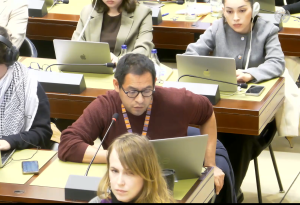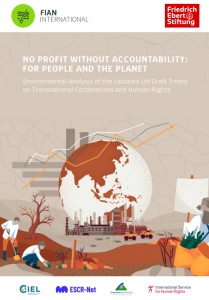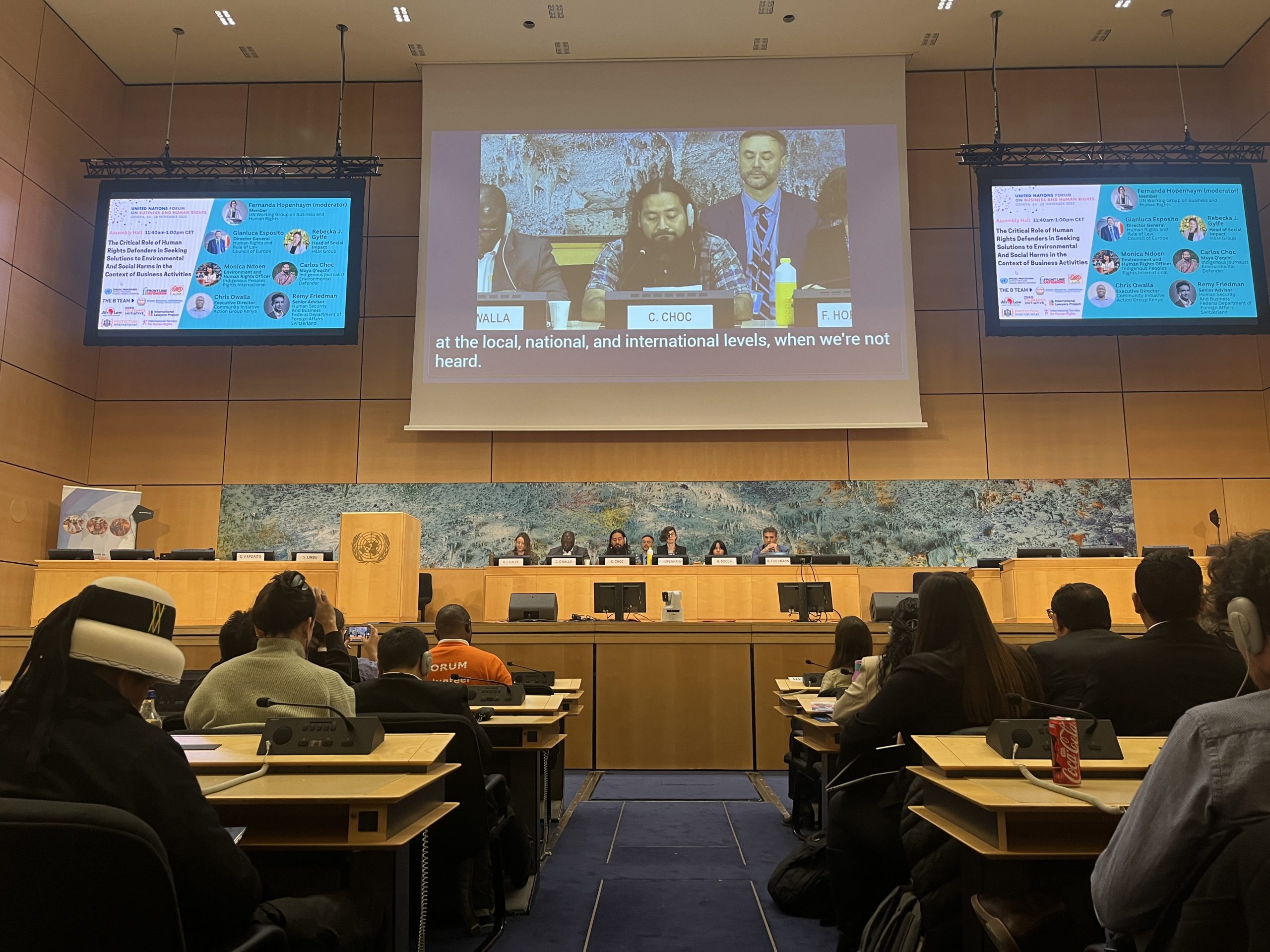The 11th session of the Open-ended intergovernmental working group (IGWG) on transnational corporations and other business enterprises with respect to human rights took place from 20 to 24 October.
This session followed three inter-sessional meetings convened to discuss specific articles of the proposed treaty – the first in April, the second and third in July, while a planned fourth meeting was cancelled due to lack of funds.
The 11th session tackled articles 12 to 24 related to mutual assistance, interpretation and application of the treaty and other general clauses. Days before this session, the Chair shared suggestions of wording to resolve issues that emerged during the inter-sessional meetings.
Unfortunately, there was little time to review these. States and civil society were therefore unable to fully analyse the proposals and discuss them during the negotiations.
Human rights defenders’ protection and participation
On the first day of the session, ISHR made a general statement emphasising that, since the inter-sessional meetings, hybrid modalities, including the possibility to submit and play video messages had been abandoned. This limited the participation of human rights defenders, civil society organisations and representatives of communities impacted by business activities that could not make it to Geneva.
Moreover, ISHR highlighted that the legally binding instrument (LBI) should provide comprehensive and enforceable protection for human rights defenders, Indigenous Peoples, people working in rural areas and other affected communities who are at the frontline of resisting corporate abuses.

© UN Web TV
Since the inter-sessional meetings, ISHR sought to include a reference to the UN Declaration on Human Rights Defenders in the preamble of the instrument, and to integrate strong protections for defenders and victims in articles 4 and 5. These proposals follow the inputs and needs that human rights defenders shared in the context of the development of the Declaration +25.
Strengthening the LBI with such protections would reflect the realities and experiences of human rights defenders.
According to the Business & Human Rights Resource Centre, during the last decade, more than 6,400 attacks across 147 countries against people who voiced concerns about business-related risks or harms were recorded.
Moreover, FORUM-ASIA found that, between 2023 and 2024 alone, there were over 450 incidents of harassment against environmental, land, and community-based defenders in Asia. These include acts of reprisals, violence and intimidation, criminalisation, harassment and arbitrary arrests, and Strategic Lawsuits Against Public Participation to silence defenders through burdensome retaliatory litigation.
Gender dimension in the draft
This year, ISHR increased its presence and support to the Feminist for a Binding Treaty (FfBT) group, which brings together a number of organisations who demand that the legally binding instrument integrates a gender perspective. During the discussions, looking at articles 15 and 16, Colombia and Uruguay proposed to include references to ‘people with diverse sexual orientation and gender identity’. While some Latin American States, the European Union as a whole, and other European countries supported this, other States – including some that are not formally engaging in the LBI negotiations – strongly opposed this language.
While there had previously been attempts to push back against inclusive language on gender, the level of opposition increased this session, particularly from Arab and some Asian States.
In response, FfBT stressed that international law already provided a clear basis for protection from discrimination and violence for all persons, regardless of their sexual orientation, gender identity or expression, or sexual characteristics. Other FfBT proposals included:
- The primacy of human rights over trade and investment agreements, with particular consideration of intersectional vulnerabilities, particularly to women and girls.
- The inclusion of gender impacts as part of the mandatory assessments of business activities.
Advancing the right to a clean, healthy and sustainable environment
This is the first IGWG session since the publication of two landmark advisory opinions on climate change by the International Court of Justice and the Inter-American Court on Human Rights. Both rulings emphasised the need to step-up efforts to address climate change, and this was an obligation for States. These opinions also laid a compelling foundation on which to formally embed the right to a clean, healthy and sustainable environment within the legally binding instrument.

© Ewelina Ulita
Since the removal of environmental language in the current draft, many delegations have demanded its reinsertion in different articles of the draft, including at the inter-sessional meetings earlier int he year.
In ISHR’s remarks, we reminded States that the right to a clean, healthy and sustainable environment could be adversely impacted by business operations, and that the LBI will not achieve its goal if it does not include environmental rights in its material scope.
As part of these efforts, ISHR, FIAN-International, FES, Franciscans International and CIEL prepared an environmental study that propose concrete legal suggestions to strengthen provisions in the LBI, ensuring an environmental dimension to the text. The suggestions include wording on environmental due diligence, protection of environmental human rights defenders, primacy of human rights and environmental obligations over trade and investment agreements, and the inclusion of the right to a clean, healthy and sustainable environment in the text.
Despite attempts to re-insert it, the right to a clean, healthy and sustainable environment is still not an integral part of the instrument.
Next steps
At the end of the week, the report of the 11th Session was adopted. This report includes a 2026 roadmap, which envisages three intersessional thematic consultations: One focusing on articles 12 to 24, the second and third on the preamble and articles 1 to 3.
Delegations and organisations can share written submission on the 13 specific proposals presented by the Chair until 1 February 2026.






